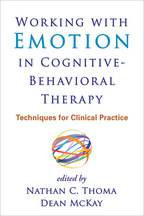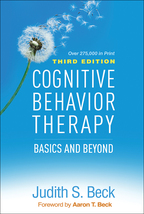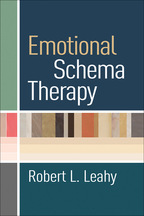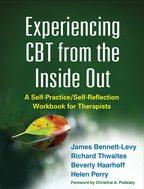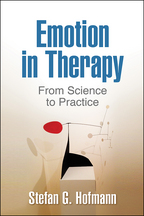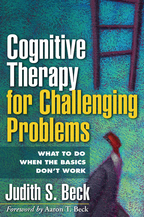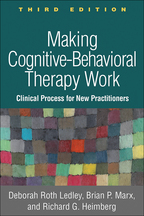Working with Emotion in Cognitive-Behavioral Therapy
Techniques for Clinical Practice
Edited by Nathan C. Thoma and Dean McKay
Hardcovere-bookprint + e-book
Hardcover
orderOctober 20, 2014
ISBN 9781462517749
Price: $67.00 416 Pages
Size: 6" x 9"
“This book covers a broad range of topics that encompass both traditional and non-traditional approaches to cognitive behavioral therapy. This includes useful discussion on compassion, mindfulness, image rescripting, and relational techniques. The book is uniquely placed in the CBT literature in its focus on emotion as the central theme in the therapeutic process. It is well structured, taking the reader on a journey through a wide variety of emotions followed by techniques that are relevant to particular diagnoses. This includes significant contributions from leading clinicians discussing their respective areas of expertise….Each chapter skillfully educates the reader on techniques whilst presenting a solid research base which has informed the therapeutic process. This book will be of relevance and interest to clinicians and CBT practitioners of all levels of experience.”

—The Psychologist
“This outstanding volume brings together the latest theory, research, and clinical strategies underlying experiential approaches to working with emotion in therapy. The contributors are the leading clinical scientists in the areas of emotion acceptance and compassion, emotion during exposure therapy, imagery rescripting, innovative ways of managing emotion in therapy sessions, and relational techniques. The chapters are brimming with useful dialogue and examples of how to apply these techniques. This is a 'must read' for practicing clinicians of all levels.”

—Michelle Craske, PhD, Professor and Vice Chair of Psychology and Director, Anxiety Disorders Research Center, University of California, Los Angeles
“Unlike many books that offer a limited perspective on what constitutes evidence-based practice, this volume is unique in that it is not restricted to a single theoretical orientation. Although it is basically a cognitive-behavioral book, the editors have included data-based chapters from distinguished contributors from varying orientations—making it a truly ‘evidence-based’ contribution to the literature. The important organizing theme that cuts across orientations is the significant role of emotion in the therapy change process. As such, this book represents an important, cutting-age perspective.”

—Marvin R. Goldfried, PhD, Distinguished Professor of Psychology, Stony Brook University
“Psychotherapy is becoming less tied to specific traditional schools, and psychotherapists of different persuasions are moving beyond emphasizing one single mode of functioning. Thoma and McKay have brought together an esteemed group of researchers and clinicians working to refine our interventions by examining techniques, modes of behavior, and models not generally highlighted in CBT. This book will be seen as an important step toward the creation of what will be called 'cognitive affective behavior therapy.' With its emphasis on affect and experience, it will be of interest to practitioners and advanced graduate students thirsty for a more complex view of human suffering and its solution.”

—Jacques P. Barber, PhD, ABPP, Professor Emeritus and Dean Emeritus, Gordon F. Derner School of Psychology, Adelphi University
“Thoma and McKay have gathered serious scientific minds to explore how to broaden and deepen clinical work with emotional experience. Techniques aimed at developing mindfulness, compassion, and the therapeutic alliance are discussed both in the form of new approaches and also in combination with ‘tried and true’ CBT methods. It is the nature of scientific efforts to go through periods of stability followed by periods of dramatic change. This book comes at a time of great change, making it an asset to clinicians who are interested in the growth and development of CBT.”

—Kelly G. Wilson, PhD, codeveloper of acceptance and commitment therapy; Department of Psychology, University of Mississippi
—The Psychologist
“This outstanding volume brings together the latest theory, research, and clinical strategies underlying experiential approaches to working with emotion in therapy. The contributors are the leading clinical scientists in the areas of emotion acceptance and compassion, emotion during exposure therapy, imagery rescripting, innovative ways of managing emotion in therapy sessions, and relational techniques. The chapters are brimming with useful dialogue and examples of how to apply these techniques. This is a 'must read' for practicing clinicians of all levels.”
—Michelle Craske, PhD, Professor and Vice Chair of Psychology and Director, Anxiety Disorders Research Center, University of California, Los Angeles
“Unlike many books that offer a limited perspective on what constitutes evidence-based practice, this volume is unique in that it is not restricted to a single theoretical orientation. Although it is basically a cognitive-behavioral book, the editors have included data-based chapters from distinguished contributors from varying orientations—making it a truly ‘evidence-based’ contribution to the literature. The important organizing theme that cuts across orientations is the significant role of emotion in the therapy change process. As such, this book represents an important, cutting-age perspective.”
—Marvin R. Goldfried, PhD, Distinguished Professor of Psychology, Stony Brook University
“Psychotherapy is becoming less tied to specific traditional schools, and psychotherapists of different persuasions are moving beyond emphasizing one single mode of functioning. Thoma and McKay have brought together an esteemed group of researchers and clinicians working to refine our interventions by examining techniques, modes of behavior, and models not generally highlighted in CBT. This book will be seen as an important step toward the creation of what will be called 'cognitive affective behavior therapy.' With its emphasis on affect and experience, it will be of interest to practitioners and advanced graduate students thirsty for a more complex view of human suffering and its solution.”
—Jacques P. Barber, PhD, ABPP, Professor Emeritus and Dean Emeritus, Gordon F. Derner School of Psychology, Adelphi University
“Thoma and McKay have gathered serious scientific minds to explore how to broaden and deepen clinical work with emotional experience. Techniques aimed at developing mindfulness, compassion, and the therapeutic alliance are discussed both in the form of new approaches and also in combination with ‘tried and true’ CBT methods. It is the nature of scientific efforts to go through periods of stability followed by periods of dramatic change. This book comes at a time of great change, making it an asset to clinicians who are interested in the growth and development of CBT.”
—Kelly G. Wilson, PhD, codeveloper of acceptance and commitment therapy; Department of Psychology, University of Mississippi

